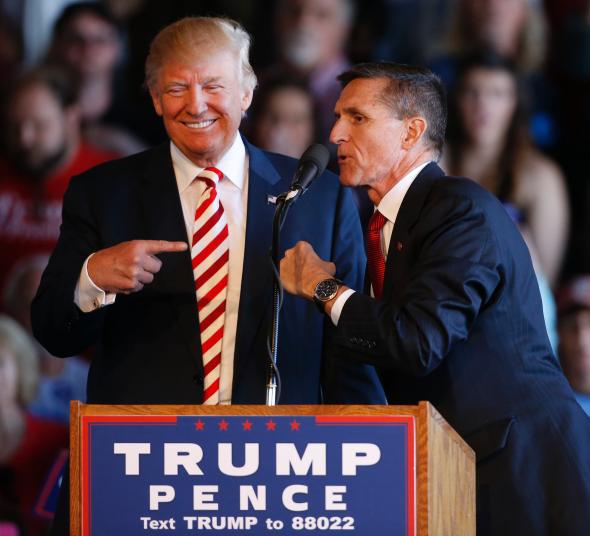On Thursday, the Wall Street Journal reported the makings of a potential bombshell: During the presidential campaign, a longtime GOP operative claiming to work with retired Lt. Gen. Michael Flynn attempted to collude with who he believed to be Russian hackers in order to procure thousands of emails deleted from Hillary Clinton’s personal server. The reporting by the Journal’s Shane Harris stops well short of connecting the dots to explicit coordination between Flynn and the Russians, but he adds a number of new data points to the conversation—and none of them look good for the Trump White House.
The GOP operative in question is Peter W. Smith, who told the Journal during an interview last month that he began shopping around for the some 33,000 deleted Clinton emails in early September 2016, two months before Election Day. Smith’s efforts came in the wake of the WikiLeaks release of hacked Democratic National Committee emails that July and a month before the organization’s release of emails hacked from Clinton campaign chairman John Podesta in October. “Mr. Smith, a private-equity executive from Chicago active in Republican politics, said he assembled a group of technology experts, lawyers and a Russian-speaking investigator based in Europe to acquire emails the group theorized might have been stolen from the private server Mrs. Clinton used as secretary of state,” according to the WSJ.
Smith, who died in May at the age of 81, a month after the WSJ interview, implied to the small circle of people he contacted for help locating the emails that he was working with Flynn, who was then a senior adviser to Donald Trump. “He said, ‘I’m talking to Michael Flynn about this—if you find anything, can you let me know?’ ” a computer-security expert who helped search hacker forums for leads told the WSJ. Emails sent by Smith—and reviewed by the WSJ—also implied Flynn was supportive of the effort to locate the Clinton emails, and went so far as to offer to arrange meetings with Flynn and his son, who worked for his dad’s company, and those he was trying to enlist to help.
Here’s what Smith’s efforts netted him (via the WSJ):
In the interview with the Journal, Mr. Smith said he and his colleagues found five groups of hackers who claimed to possess Mrs. Clinton’s deleted emails, including two groups he determined were Russians.
“We knew the people who had these were probably around the Russian government,” Mr. Smith said.
Mr. Smith said after vetting batches of emails offered to him by hacker groups last fall, he couldn’t be sure enough of their authenticity to leak them himself. “We told all the groups to give them to WikiLeaks,” he said. WikiLeaks has never published those emails or claimed to have them. Mr. Smith and one of his associates said they had a line of communication with Mr. Flynn and his consulting company …
… The operation Mr. Smith described is consistent with information that has been examined by U.S. investigators probing Russian interference in the elections. Those investigators have examined reports from intelligence agencies that describe Russian hackers discussing how to obtain emails from Mrs. Clinton’s server and then transmit them to Mr. Flynn via an intermediary, according to U.S. officials with knowledge of the intelligence. It isn’t clear who that intermediary might have been or whether Mr. Smith’s operation was the one allegedly under discussion by the Russian hackers. The reports were compiled during the same period when Mr. Smith’s group was operating, according to the officials.
Harris’ reporting is presumably the opening salvo in this line of investigation that, for the first time, implies explicit collusion between the Trump campaign and Russia. A Trump campaign official said Smith didn’t work for the campaign and Flynn, if he was involved, was participating in a personal capacity, not as a campaign official. The fact that Smith didn’t officially work for the Trump campaign seems like a no-brainer for obvious reasons, but doesn’t mean he wasn’t acting at the behest of someone on the campaign. Whether Flynn was acting in a personal or professional capacity, at the moment, is a distinction without a difference. Yes, at some point it would be important if he was relaying orders, or acting on behalf of someone higher up on the Trump campaign—of which there weren’t many—presumably Steve Bannon, who was leading the campaign at that point, or even the president himself.
What the Journal story does indicate, however, is that a GOP operative who presented himself as working with Mike Flynn, a top Trump adviser with numerous dodgy Russian ties himself, actively solicited Clinton emails from hackers he believed to be Russian and assumed to be affiliated with the Russian government. Once he obtained a stash of unverified emails presented as the deleted Clinton emails, this operative then suggested the hackers release the cache to WikiLeaks one month after the DNC WikiLeaks dump and a month before the Podesta WikiLeaks dump.
How involved was Flynn really? How much higher does it go in the Trump White House, if at all? These are questions that will need answers as Robert Mueller’s investigation grinds on. Flynn has exhibited a penchant for recklessness and utter dishonesty, which is, in part, why he is no longer the National Security Adviser. Will this new line of investigation bring him down? Or will it save him? In March, Flynn asked for immunity in return for his testimony on Russia. To get it, he would need to know something big, presumably that touched the president. At the time Flynn’s lawyer said of the immunity request: “General Flynn certainly has a story to tell, and he very much wants to tell it, should the circumstances permit.” The circumstances are certainly changing, and Flynn’s version of this particular story just got a lot more valuable.
